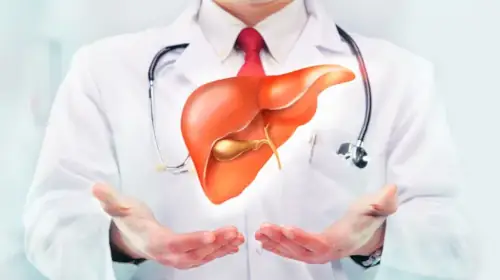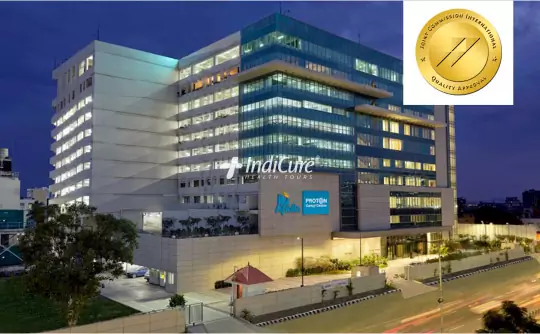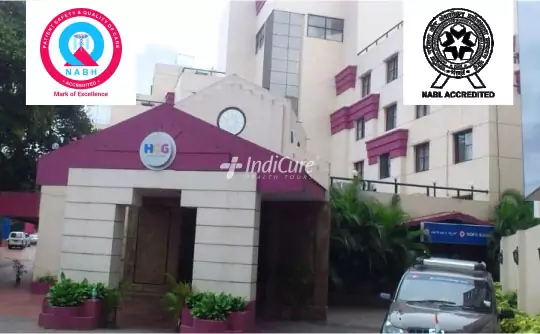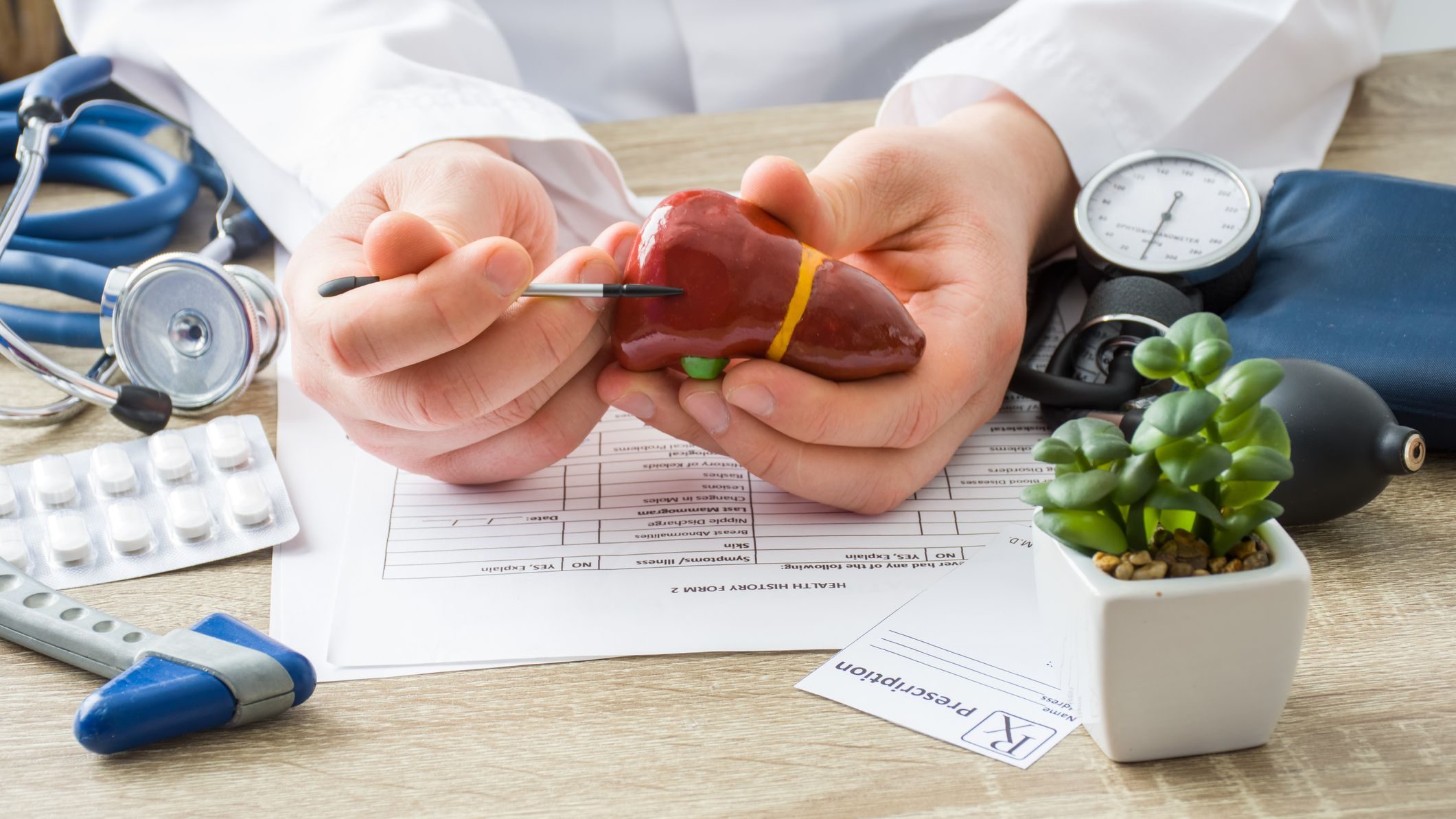

Liver Cancer Treatment Cost in India depends on the type of treatment required, your medical condition, hospital and the city where you choose to get the treatment done. You may need either surgery or chemotherapy, or may need both; or a combination of chemotherapy, radiotherapy and surgery. The cost would thus change accordingly.
Typical Costs for Liver Cancer Treatment in India looks like:
| Procedure | Cost (Range in US $) |
|---|---|
| Investigations | 500-1,000 |
| Chemotherapy | 500-2,000 per cycle |
| Radiotherapy | 3,500-5,500 |
| Surgery | |
| Liver Resection | 7,500-9,000 |
| Liver Transplant | 30,000-45,000 |
| Cryosurgery | 1,500-3,000 |
| Radiofrequency Ablation | 1,600-3,500 |
Many times, the best option might include more than one type of treatment. Surgery, alone or with other treatments, is used to treat most liver cancers. The cost associated with each type of treatment is different. IndiCure recommends you to understand the options by consulting our expert oncologists.
The overall liver cancer treatment cost depends on the number of chemotherapy or radiation therapy cycles that a patient has to undergo. In some patients, the doctors might advise giving more than a couple of cycles of chemotherapy or radiation therapy to kill the cancerous cells.
An important expense when it comes to your liver cancer treatment in India is going to be your oncologist's fees. IndiCure recommends highly experienced, skilled, board-certified surgeons who are capable of delivering successful surgeries. Although the charges may vary depending on the experience of the surgeon, you can be assured that you are in safe and skilled hands when you choose cancer treatment in India with IndiCure.
Having your treatment for liver cancer in an accredited surgical facility by skilled and qualified medical staff is a critical factor. Moreover, the geographical location of this facility in India also affects the quote. But, IndiCure provides you with a projected estimate that will be all inclusive and affordable.
The pre-surgical/treatment expenses are associated with the stage of the cancer and medical condition of the patient and thus the number and type of investigations and treatment required. Post-treatment expenses may include prescription medications and follow-up consultations.
We at IndiCure, understand that you travel with a budget in mind and do not like to be greeted by surprises after arrival in India. We thus club all these expenses and give you the package cost that is inclusive and affordable at the same time.
Your case manager shall give you an estimated cost of your surgery after discussing your medical reports with the surgeon. The final cost, however, shall be confirmed after your consultation with the surgeon.
In fact, we have Special Negotiated Rates with the Hospitals and you can avail Discounted Rates when you choose to Travel with IndiCure.


We Help you Choose the Right Treatment, Surgeon & Hospital

We Arrange Video/Telephonic Consultation with the Surgeon

We Assist you with Visa & Accommodation

We Receive you at the Airport and Drop you at Hotel/Hospital

We Assist you the at Hospital & Provide Post Operative Support

Chennai
The Apollo Proton Cancer Centre (APCC) is South Asia's and the Middle East's first and only proton therapy centre, as well as India's first JCI-accredited cancer hospital. The APCC includes a completely integrated treatment suite that provides the most advanced surgical, radiation, and medical procedures available. The Centre brings together a remarkable team of clinicians renowned globally in cancer care, in keeping with the Apollo Pillars of Expertise and Excellence.

Bangalore
HCG- HealthCare Global Enterprises Ltd, is the specialized chain of hospitals in cancer care headquartered in Bangalore. Founded by Dr. Ajaikumar, a renowned medical and radiation oncologist with 40 years of experience, HCG has 26 centres across India with its largest facility in Bangalore.
HCG Hospital Bangalore is not only the most advanced facility for cancer care in India, it is a Centre of Excellence for most advanced cancer care and research.
Liver is one of the most important organs in the human body located in the right upper part of the abdomen just beneath the diaphragm. Liver performs a wide spectrum of functions which include maintaining and regulating the storage of glycogen, production of hormones, plasma proteins, RBC decomposition, detoxification and production of bile that helps in digestion.
There are mainly two types of Liver cancer:
Cancer that originates in the liver cells itself is called Primary liver cancer. There are two types of primary liver cancer:
It is the cancer that has originated in the other parts of the body but has spread to liver (known as metastasis)
Initially, liver cancer does not produce any signs and symptoms but when they appear, it includes weight loss, loss of appetite, pain in the upper abdomen, generalized weakness and fatigue, nausea, vomiting, yellow discolouration of skin and eyes, abdominal swelling etc.
Once liver cancer is diagnosed, it is important to know the stage of the cancer to plan appropriate treatment to get out of it in time. There are 4 stages of liver cancer.
Cancer occurs when DNA of the cells undergo mutation and these mutated cells then grow without control in an abnormal way giving rise to the tumor.
The exact cause of liver cancer is unknown but like other cancers there are certain risk factors that may lead to liver cancer. These are:
If you are suffering from any of the above mentioned symptoms, you should see a doctor immediately who would advise various tests for a correct diagnosis. If you are found to suffer from liver cancer, the treatment should be started immediately.
There are various treatment options for liver cancer. The treating doctor would suggest the best treatment for the patient or a combination of these depending upon the medical condition of the patient:
This entails killing the cancerous cells using an instrument called cryoprobe that delivers nitrogen which freezes and kills the cells.
This procedure includes insertion of the needles to reach tumor through small incision in the abdomen and then heating the needle at very high temperature with an electric current to destroy the targeted cancerous cells.
Strong anti- cancer drugs are injected in the hepatic artery which is then blocked so as to cut the blood supply to the cancer cells which makes them shrink and ultimately die. This procedure is often called chemoembolization.
By using the high powered energy beams, the cancer cells are targeted to shrink and die. The new advanced technique called stereotactic radiotherapy can be used to treat liver cancer.
The drugs that interfere with the tumor function and inhibit the advancing spread of carcinoma are used to control the cancer. Sorafenib is one such drug.
Liver surgery is the most commonly performed procedure for liver cancer. There are mainly two types of surgical procedures:
The first step is to identify and match the donor. For that, both the patient and donor have to undergo multiple tests like abdominal CT, cholangiogram, chest x-ray, ECG, ECHO etc. to confirm that the donor and patient are healthy enough to survive the surgery.
The donor will be operated to remove the lobe of the liver. Either the left or right lobe is removed depending on the age of the person. If the patient is a child then the left lobe is taken as it is smaller and best suited for children and the right one is usually taken for adults. After harvesting is done, the incisions are closed with the sutures. This completes the surgery of the donor.
The diseased liver of the patient is then removed by making an incision on the right upper quadrant of the abdomen. It is then replaced with the healthy liver that has been taken from the donor's body and the respective blood vessels and the biliary ducts are anastomosed with the lobe of the liver. As the liver has the tendency to regenerate the lobe that has been transplanted grows quickly and regenerates itself to the original size within a week after the surgery.
We at IndiCure completely understand your concerns and it is always our endeavor to provide the best outcome for every patient. Following is the list of questions you must ask before you embark on your journey for liver cancer treatment in India.
Prepare to answer questions about your:

The results of Liver Transplant Surgery are gratifying. One can return to a normal lifestyle within 6 months after the surgery. Healthy diet, regular exercise and proper medications add on to the faster recovery and help lead a healthy and active life ahead.
After the surgery, the patient is moved to the Intensive care unit where the patient would be staying for 5-6 days. After the vitals are stabilized, the patient is moved to the room for about 3 weeks. One may feel pain and discomfort after the surgery which is normal and shall be controlled with medications. Recovering from liver transplant surgery is a slow and long process that aims to slowly make you healthy and fit. It may take about 6 months to resume your normal daily activities.
Liver cancer is not a common disease, but the number of people diagnosed with liver cancer is continuously rising. According to medical experts, roughly 1% of all men and women in the United States will be diagnosed with liver cancer at some point in their lives.
Yes. There are 3 kinds of Primary Liver Cancer.
Hepatocellular Carcinoma: HCC (hepatocellular carcinoma) is the most frequent type of liver cancer, accounting for virtually all occurrences.
IHC (intrahepatic cancer) is a kind of cholangiocarcinoma. IHC is cancer of the bile ducts of the liver. It accounts for roughly 10% to 20% of all primary liver cancer cases.
Angiosarcoma: This form is extremely rare, accounting for just around 1% of all occurrences of primary liver cancer. This malignancy starts in the lining of your liver's blood cells. (Angiosarcoma can affect other organs as well.)
HCC and IHC account for around 2% of all new cancer cases and 5% of all cancer deaths in the United States. HCC and IHC are frequently diagnosed and treated in the same way by healthcare experts.
HCC and IHC are more common in males than in women, and they are diagnosed most frequently between the ages of 55 and 64. Asian/Pacific Islander, Hispanic, and American Indian/Alaskan Indian persons are more likely than Black or white people to acquire primary liver cancer.
If your healthcare professional notices liver cancer early symptoms, they may suspect you have the disease. To discover more, they will ask you to undergo further tests like CT, MRI, blood tests, biopsy, Angiogram, ERCP etc.
When the DNA of healthy liver cells changes, liver cancer develops. The genes that inform our cells how to work are stored in DNA. Cells have genes that tell them when to grow, reproduce, and die, and we all have them.
Oncogenes, for example, aid cell growth and division. Other genes, known as tumor suppressor genes, keep an eye on cell activity, preventing them from growing uncontrolled and ensuring that cells die when they should.
Our cells receive new instructions when our DNA mutates or changes. DNA alterations in HCC activate oncogenes and/or repress tumor suppressor genes. Cirrhosis caused by the hepatitis B and C viruses, for example, accounts for more than half of all HCC cases, according to research.
When these viruses infect liver cells, they alter the DNA of the cells, causing healthy liver cells to become malignant.
Your liver is your body's largest organ, and it aids in digestion. It's also one of the most vital organs, because no one can survive without it.
The following are some of the vital functions that your liver performs:
Long-term inflammation in your bile ducts, according to doctors, raises your chances of having IHC. Long-term inflammation may trigger DNA alterations in healthy cells, causing them to become aberrant.
You may have no symptoms at all if you have liver cancer in its early stages. The symptoms of hepatocellular carcinoma (HCC) and intrahepatic cholangiocarcinoma (IHC) are the same:
Unfortunately, you can develop liver cancer at any age and have no symptoms. If you know you're at risk for liver cancer, talk to your doctor about having tests done to monitor your liver and maybe spot it early on.
Liver cancer screening is a way for doctors to check for indicators of liver cancer in your liver. Although there are no standard liver cancer screening tests, your doctor may prescribe that you have ultrasounds and blood tests every six months.
While there is no way to totally avoid liver cancer, you can reduce your risk by doing the following:
Successful liver transplants can cure liver cancer, but not everyone who requires one is healthy enough to undergo the procedure or able to find a donor. According to studies, persons who have surgery to remove a portion of their liver survive longer than those who are unable to have surgery due to their sickness. When this happens, healthcare experts focus on treatments to help individuals live as long as feasible with a high quality of life.
Healthcare practitioners are making advances in the treatment of liver cancer, allowing people to live longer. However, liver cancer is still a life-threatening condition.
According to statistics, 35 percent of persons diagnosed with early-stage hepatocellular carcinoma (HCC) in the liver survive five years after treatment. Five years after diagnosis, about 12% of persons with HCC that have progressed to surrounding tissues, organs, or lymph nodes are still alive. Five years after diagnosis, about 3% of persons with HCC that have progressed farther are still alive.
Intrahepatic bile (IHC) duct cancer has a five-year survival rate of 24% for bile duct cancer that hasn't gone outside of your liver, 9% for cancer that has spread to adjacent lymph nodes, and 2% for cancer that has spread farther.
The length of stay would depend on the type of treatment required. If you just need liver resection surgery, a stay of 2-3 weeks should be enough. However, if you need liver transplant surgery, you would need to stay for 3-4 months in India.
No. You will have to bring the docnor with you who should be closely related to you. It is illegal to buy or sell any organ in India. Only close relatives can donate an organ to you out of love and compassion.
Enhance your medical journey to India by availing these extra services.
Traveling abroad for medical reasons may be challenging. With our experience of over a decade and working with the best surgeons and top hospitals in India, we help make your medical tour easier and safer for you. We will guide you at every step of the way and make end-to-end arrangements for your surgery, travel, and stay.
Ramandeep Dhaliwal
I had great experience having rhinoplasty through Indicure. Dr. Ruchika from Indicure has helped me in finding best plastic surgeon, answering all my questions...
Read More
Joshua Archer
My name is Joshua Archer I'm from New Zealand, bay of plenty, kawerau I opted for the bypass surgery in January 2023 but planned it in advance for 28 September found IndiCure...
Read More
Kera Ren
Absolutely loved my experience with IndiCure - from first inquiring to meeting the surgeon pre op to my follow up post op. The surgeon was extremely approachable...
Read More
Andreana Paul
Had a wonderful experience. Visited India for my plastic surgery. From sending mails, airport pickup, comfortable accommodation and, to smooth hospital appointment booking...
Read More
Brandi Luce
I had the privilege of using Indicure's services for a cosmetic procedure that I had wanted for a long time but had always been apprehensive about. Ruchika helped me...
Read More
Jade M
Indicure Health Tours went above and beyond my expectations. They helped me with every aspect of my journey and were professional, kind and caring. I was...
Read More
The content on the website (www.indicure.com) is intended to be general information and is provided only as a service. All photographs on our website of before and after results are examples only, and do not constitute an implied or any other kind of certainty for the result of surgery.
Learn about IndiCure Health Tours' comprehensive editorial policy that strives to deliver trustworthy, helpful, relevant, accurate and people-first content on medical tourism in India.
It is not medical advice and should not be taken as medical advice. It should not be used to diagnose or treat a health condition and is in no way meant to be a substitute for professional medical care. You are advised to see a surgeon in person to assess what surgery may or may not accomplish for you.
It is also important to keep your expectations realistic and to understand that all surgical procedures carry risks and should never be taken lightly.